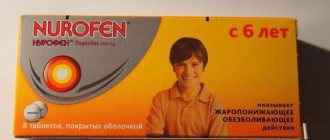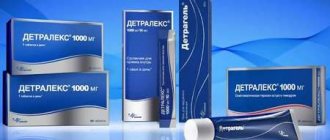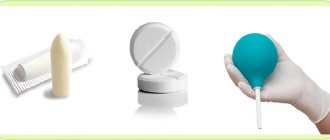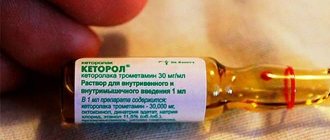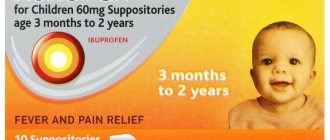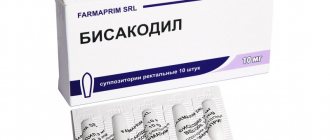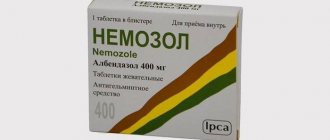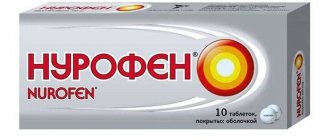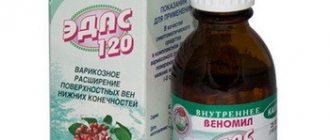The health of the child is the most important thing for parents, therefore, at the slightest sign of fever, the mother resorts to the use of antipyretic drugs. Pediatricians recommend resorting to the use of antipyretics in exceptional cases when the thermometer shows 38-38.5 degrees. To reduce the temperature, they resort to using a drug such as Nurofen syrup. Let’s find out in more detail when the temperature normalizes when using the drug Nurofen.
Operating principle
Nurofen is an anti-inflammatory non-steroidal substance that has anti-inflammatory, analgesic, antipyretic properties. It actively affects prostaglandins produced in the body during the occurrence of inflammatory processes, pain and temperature reactions, inhibiting their production and reducing inflammation.
Once in the intestines, ibuprofen is absorbed by its mucous membrane, enters the blood, where it forms compounds with plasma proteins, providing an effective effect for up to 8 hours. All transformations of the main component occur in the liver and are excreted in the urine.
The product in this form is considered the most effective compared to tablets and syrups, since absorption of the drug by the intestinal mucosa occurs in about 10-15 minutes and it begins to act literally after 20 minutes, which is especially important if the baby has a high fever or severe pain began.
Compatibility with other drugs
It is not recommended to take Nurofen tablets simultaneously with acetylsalicylic acid (ASA) and other NSAIDs. When administered simultaneously, ibuprofen reduces the anti-inflammatory and antiplatelet effect of acetylsalicylic acid (ASA) (it is possible to increase the incidence of acute coronary insufficiency in patients receiving small doses of acetylsalicylic acid (ASA) as an antiplatelet agent after starting ibuprofen). 1When prescribed with anticoagulant and thrombolytic drugs (alteplase, streptokinase, uroupase), the risk of bleeding simultaneously increases. Cefamandole, cefaperazone, cefotetan, valproic acid, plicamycin, increase the incidence of hypoprothrombinemia. Cyclosporine and gold preparations enhance the effect of ibuprofen on the synthesis of prostaglapdins in the kidneys, which is manifested by an increase in nephrotoxicity. Ibuprofen increases the plasma concentration of cyclosporine and the likelihood of developing its hepatotoxic effects. Drugs that block tubular secretion reduce excretion and increase plasma concentrations of ibuprofen. Inducers of microsomal oxidation (phenytoin, ethanol, barbiturates, rifampicin, fepilbutazone, tricyclic antidepressants) increase the production of hydroxylated active metabolites, increasing the risk of developing severe hepatotoxic reactions. Inhibitors of microsomal oxidation - reduce the risk of hepatotoxicity. Reduces the hypotensive activity of vasodilators, natriuretic in furosemide and hydrochlorothiazide. Reduces the effectiveness of uricosuric drugs, enhances the effect of indirect anticoagulants, aptiagregants, fibrinolytics. Increases the side effects of mineralocorticosteroids, glucocorticosteroids, estrogens, ethanol. Enhances the effect of oral hypoglycemic drugs, sulfonylurea derivatives and insulin. Antacids and cholestyramine reduce absorption. Increases the blood concentration of digoxin, lithium preparations, methotrexate. Caffeine enhances the analgesic effect.
Indications
Nurofen is most in demand as an antipyretic and analgesic when an infectious disease occurs, accompanied by an increase in body temperature and pain of various origins. Therefore, the instructions indicate that it is prescribed in the following situations:
- acute respiratory viral infections;
- flu;
- acute otitis;
- bacterial infections (scarlet fever, measles, etc.);
- intestinal infections;
- complications after the vaccine;
- during teething, against which secondary infection may occur;
- headache and toothache;
- a sore throat;
- joint pain;
- for bruises and broken bones;
- as postoperative therapy;
- for neuralgia;
- when muscle pain occurs.
special instructions
During long-term treatment, monitoring of the peripheral blood picture and the functional state of the liver and kidneys is necessary. When symptoms of gastropathy appear, careful monitoring is indicated, including esophagogastroduodeposcopic examination, a complete blood count (hemoglobin determination), and a stool test for occult blood. If it is necessary to determine 17-ketosteroids, the drug should be discontinued 48 hours before the study. Freemen must refrain from all types of activities that require increased attention, quick mental and motor reactions. During the treatment period you should refrain from drinking alcoholic beverages.
Contraindications and side effects
Nurofen is contraindicated for use if:
- baby's weight is less than 6 kg;
- the baby had an allergic reaction during previous use of non-steroidal medications;
- there is a history of gastric ulcers and a tendency to bleeding;
- the child has kidney and liver diseases in acute and chronic forms;
- there is a cerebral hemorrhage;
- heart failure and blood clotting problems were determined.
In addition, the instructions indicate that there are a number of diseases for which Nurofen must be taken with extreme caution and only after consultation with a doctor.
The following side effects are also possible during use:
- various allergic manifestations on the skin (swelling, dermatosis, erythema, urticaria, etc.);
- exacerbation of bronchial asthma;
- nausea and abdominal pain;
- the appearance of headache;
- diarrhea.
In some cases, a disorder of hematopoiesis is possible, which is accompanied by the following symptoms:
- general weakness;
- the appearance of various bleeding (nosebleeds, bruises on the skin);
- formation of mouth ulcers and sore throat.
If your baby experiences similar symptoms after the first use, you should consult a doctor to adjust the treatment.
Instructions for use and dosage
Suppositories are used exclusively for rectal use: the suppository is carefully inserted into the anus. The dosage is calculated using the following factors: baby’s weight, age.
A single dosage consists of one suppository. At the age of 3 to 9 months, according to the instructions, use 1 suppository 3 times a day. From 9 months to 2 years, use 1 suppository 4 times a day. The interval between use should be at least 6 hours. It is advisable to use Nurofen in this form after the baby goes to the toilet.
However, if you inserted a suppository, after which the baby went to the toilet, and the drug did not have time to dissolve, you can use another suppository, but it is better to wait 30 minutes to make sure that the effect has not really occurred. For infectious diseases, the course of treatment should not exceed 3 days, and for pain syndromes - no more than 5 days.
If a baby aged 3 to 5 months does not experience improvement when taking Nurofen, you should consult a doctor. For children over 6 months of age, observation for 3 days is acceptable.
Overdose
An overdose of the drug is possible if the dose exceeds 200 mg/kg of weight of the toddler and it manifests itself with the following symptoms:
- stomach ache;
- nausea accompanied by vomiting;
- diarrhea;
- the occurrence of severe headache;
- noise in ears;
- gastrointestinal bleeding.
In case of severe poisoning, the following manifestations are possible:
- disruption of the central nervous system (drowsiness, convulsions, disorientation and even possible coma);
- development of metabolic acidosis;
- increase in prothrombin index;
- renal failure;
- liver tissue damage;
- decreased blood pressure;
- respiratory depression.
If you have bronchial asthma, an overdose may worsen the disease . Treatment in such a situation is symptomatic, while the airway is monitored and vital signs are monitored. Therefore, parents need to carefully read the instructions for use before use so as not to harm the baby.
Analogs
There are a number of analogues approved for children. These include:
- Ibuprofen. This product is a complete analog and is available in the same dosage as Nurofen, and can be used by children from 3 months.
- Panadol (children). The main active ingredient is Peracetamol, it is approved for children aged 6 months and older.
- Tsefekon D. The effect of the drug is due to the presence of paracetamol in the composition, but it is approved for children from 1 month, since one suppository has a concentration of 50 mg.
- Efferalgan. This drug is based on paracetamol, it has different concentrations and is used for children of different age categories. The minimum dosage is 80 mg and Efferalgan is approved for babies from 3 months, not earlier.
- Analdim. The suppositories contain analgin and diphenhydramine. 1 suppository contains 100 mg of analgin and 10 mg of diphenhydramine. This product is recommended for use by babies no earlier than 1 year of age.
Reviews
Quite often, the experience of other mothers helps to learn more about the drug and its real action, so we have read some reviews about Nurofen and want to share this information with you.
- User Lady Marmalade shares her experience . She has two children, and Nurofen in suppositories practically did not help the eldest; the temperature dropped very little, despite the fact that she had to use an inflated dosage. The situation with the youngest is somewhat different: he suffered for a long time with his teeth (they began to erupt late and hurt). This drug helped relieve the symptoms for a while, which provided the baby with a good and restful sleep, but the effect is not as long-lasting as indicated in the instructions for use, and there is one negative point: suppositories often provoke bowel movements, more quickly than when using laxatives.
- User Neonella shares the following: her daughter fell ill with an infectious disease, had a high temperature (39°) and a very sore throat, so the baby flatly refused not only food, but also medicine in the form of syrup (it was too painful to swallow), so she had to run to the pharmacy for suppositories and it was there that she was advised to take Nurofen suppositories. The result was as follows: the drug did not lower the temperature, but also did not allow it to rise. As a result, I had to call an ambulance to give me an injection. Later, after reading the instructions for use, she saw that the drug was recommended for children weighing up to 12 kg, and her daughter’s weight was approximately 15 kg, so such low effectiveness could perhaps be justified by this factor. So the advice to other mothers is the following: carefully read the instructions before purchasing the drug to determine the necessary and effective dosage.
- A mother with the nickname Muumimamma writes the following: she purchased Nurofen suppositories even before the baby was born, while collecting a baby’s first aid kit. And when my daughter was 7 months old, a cold came knocking on the door. She developed a high fever, cool compresses did not help, so she had to resort to medications. The candle worked quickly enough and the girl fell asleep, but literally a few hours later the temperature rose again and she had to use this remedy again. But for the third time, Nurofen did not help lower the temperature, so the sensations are very contradictory: there seems to be an effect, but it is short-lived and not always effective.
- Irisk@ya shares her experience : when her daughter was 10 months old, the baby fell ill, and the high temperature did not take long to arrive. The doctor recommended these particular suppositories and they really helped, but the effect was short-lived and the drug in this form is not always convenient to take with you (if you are planning a trip, for example). In addition, Nurofen has complete analogues and they are much cheaper, is it worth overpaying in this case?
- Daughters of user .paint.it.black. got vaccinated with DTP. On the second day, she developed a high temperature (above 39°), and since suppositories act much faster than syrups and tablets, she purchased Nurofen and gave it to her daughter, according to the instructions for use. As a result, after 20 minutes the child went to the toilet, so the antipyretic drug became a laxative, so we had to give syrup to somehow bring down the fever.
As the experience of these mothers shows, the drug is effective in some cases, but not in others, so it is quite difficult to say that the medicine is effective and 100% effective, because all children are different and react differently to certain medications.
Video
I suggest you watch a short video that describes all the features of Nurofen syrup.
As you can see, this drug has a lot of advantages, so it has rightfully earned its place in the first aid kit for a newborn. But, at the same time, you should strictly adhere to the indicated dosage. Definitely, do not forget about regular use of vitamins. If the season does not allow you to diversify your baby’s diet with fresh fruits and vegetables, purchase special vitamin complexes, such as Pikovit for children or Supradin Kids. Such complexes contain all the necessary microelements and vitamins to strengthen the immune system and the active growth of a healthy baby. Now share your reviews of Nurofen syrup in the comments on the website: have you tried giving it to your baby, and how quickly did you see the effect of the treatment?
Helpful information
Medicines in the form of suppositories are a fairly convenient form, especially for children. Today you can find various drugs produced in this form. For example, another antipyretic drug for children is considered to be Paracetamol suppositories or another representative, namely Efferalgan. Cefekon has also proven itself well for children, which contains the well-known paracetamol, but little Viburkol, also available in the form of suppositories, will help cope with acute respiratory diseases or strengthen the immune system.
Tell us, what means do you use to combat high fever in a child and what drugs are most effective in combating such an illness? Share your experience in the comments. We will be glad if you also share your tips on this matter, because this information may be useful for other mothers. And also do not forget to leave your feedback on the article you read.
Release form
Nurofen is available in several forms, thanks to which each patient can choose the most suitable option for himself. In pharmacies you can find the drug in this form:
- Tablets for oral administration.
- Effervescent tablets for preparing a solution.
- Capsules.
- Gel for external use.
- Suppositories.
- Suspension.
Depending on the form of release, each drug has its own name, for example: Nurofen Forte, for children, etc. Today I propose to focus on one of the most convenient forms of the drug for the treatment of infants - suspension. The fact is that the medicine in this form has a very pleasant, sweetish orange or strawberry taste, so there is no need to force children to drink it.
At the same time, the syrup is sold in plastic bottles, so you can always take it with you on the road without worrying that the bottle will break. The product is sold in volumes of 100, 150 and 200 ml, but each comes with a convenient dispenser syringe. With its help, you can accurately measure the required amount of syrup and give it to your child.
